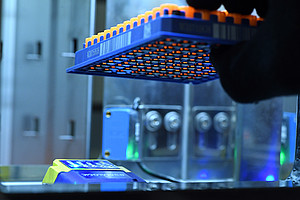Researchers from the Charité and the Max Delbrück Center launch European network

Berlin, 13 December 2022
What if diseases did not arise in the first place? What exactly is the transition from health to disease? What do inflammatory harbingers of disease tell us? And how do nutrition and the gut microbiome together influence the immune system? Under the leadership of researchers at Charité – Universitätsmedizin Berlin and the Max Delbrück Center, teams in Germany and several European countries are searching for strategies to maintain health and ways to detect diseases at an early stage. The European Union is funding the IMMEDIATE project with more than seven million euros over the next four years.
Many organic diseases start with chronic inflammation. However, what happens at the molecular level in the body during this transition from healthy to sick is largely unknown. With the IMMEDIATE project, European and Israeli researchers now want to shed more light on this hidden process and find out to what extent it can be modified by nutrition and the gut microbiome to prevent diseases from developing in the first place. The term IMMEDIATE stands for “Imminent Disease Prediction and Prevention at the Environment Host Interface”.
In order to assess individual disease risks and intervene in time, the work aims to find measurable indicators, so-called biomarkers, explains project leader Prof. Dr. Friedemann Paul, director of the Experimental and Clinical Research Center (ECRC), a joint facility of Charité and the Max Delbrück Center: “We first want to better understand the inflammatory processes that precede organ dysfunction or damage. We also want to identify biomarkers that we can use to detect processes even before disease symptoms occur.” To do this, the researchers will apply state-of-the-art omics technologies and use clinical data and biosamples from three ongoing observational studies, among other things. “These are the German NAKO Health Study and a cohort of patients in the multicenter KTx360° study at transplant centers who have had a kidney transplant and thus restarted kidney function. In addition, there is a specific Israeli cohort,” said Dr. Chotima Böttcher of the ECRC, who is co-coordinating the project.
A research group led by Prof. Dr. Tobias Pischon at the Max Delbrück Center will contribute to the project with extensive proteome analyses. The team wants to determine a large number of inflammation markers and identify signatures that are associated with changes in cardiovascular and kidney function as well as metabolism. The researchers will then examine whether these signatures are similar or different in different diseases. In parallel, a research group led by Sofia Forslund, PhD, at the Max Delbrück Center and ECRC will look at whether a particular gut germ can alleviate inflammation. “Our goal is to understand how and why interventions such as a certain diet or the administration of specific microbiotics change the composition of the gut microbiome – and how metabolites of the microbes influence the immune system,” says Dr. Forslund. In the future, this knowledge should make it possible to prevent diseases and promote health in a targeted manner. Dr. Forslund’s team will develop the necessary infrastructures and analytical methods to collect the huge amounts of data generated by omics technologies and evaluate them using artificial intelligence. Other researchers at Charité and working groups at the Berlin-Buch Campus are involved in the extensive analysis project, including the “Proteomics” group led by Dr. Philipp Mertins, “Metabolomics” led by Dr. Jennifer Kirwan, “Immune-microbial dynamics in cardiorenal diseases” led by Dr. Nicola Wilck, and the Clinical Research Unit led by Dr. Anja Mähler.
The knowledge gained will be tested in practice in a further step. To this end, the IMMEDIATE consortium is planning its own intervention studies – such as a study with around 200 participants working in a hospital. “Since our test subjects often have a lot of stress due to their jobs, and usually eat irregularly and rather unhealthily, we assume that their inflammation levels are elevated,” suspects private lecturer Böttcher. Among other things, the researchers want to find out whether the administration of the anti-inflammatory microbe Akkermansia muciniphila can change both the biomarkers and the well-being of the test subjects for the better. Mobile apps developed by the IMMEDIATE team in collaboration with patient organizations are expected to help. These give feedback and provide instructions to make it easier to integrate proven health-promoting measures into one’s own life – so that their users stop and turn around before they even reach the threshold of disease.
Photo: Proben in der Biobank. © Max Delbrück Center | David Ausserhofer
About IMMEDIATE
The network, which involves a total of twelve European institutions, is coordinated by Prof. Dr. Friedemann Paul, Director of the Experimental and Clinical Research Center (ECRC), a joint institution of Charité and Max Delbrück Center. Prof. Paul is Vice Dean for Research with Clinical Focus at Charité and a scientist at the NeuroCure Clinical Research Center. The new project is financially supported by the European research framework program Horizon Europe with a total of about 7.2 million euros. The Charité will receive a good 1.6 million euros of this, and the Max Delbrück Center around one million euros. The European Research and Project Office (Eurice) is also involved in the planning and implementation of the major project. IMMEDIATE will start on January 1, 2023 and will run for 4 years. The Grant Agreement No. is 101095540.
Links:
Experimental and Clinical Research Center
Hochschulambulanz für Neuroimmunologie und AG Paul am ECRC
Molekulare Epidemiologie l AG Pischon am Max Delbrück Center
Wirt-Mikrobiom Faktoren in Herz-Kreislauferkrankungen l AG Forslund am Max Delbrück Center und ECRC
NAKO Gesundheitsstudie
